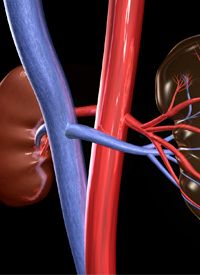Cabozantinib Shows Strength After Immunotherapy in Renal Cell Carcinoma
Cabozantinib demonstrated impressive progression free survival when administered post-immunotherapy in patients with metastatic renal cell carcinoma.

Cabozantinib (Cabometyx) demonstrated impressive progression free survival (PFS) when administered post-immunotherapy in patients with metastatic renal cell carcinoma (RCC), according to findings from a retrospective real-world study.1
Overall findings from the study, which were presented at the 2020 Genitourinary Cancers Symposium, showed that most patients who progressed on immunotherapy (single-agent or in combination with other agents) were treated subsequently with either VEGF TKIs or mTOR inhibitors.
Of 162 patients with metastatic RCC who were referred to 16 Italian centers that were part of the Meet-Uro group, 111 (68.5%) were treated after progression on immuno-oncology drugs. Of the 79 patients (71.2%) who received subsequent cabozantinib, median PFS was 7.6 months (95% CI, 5.2-10.1 months), compared with a median of 3.2 months (95% CI, 1.8-4.5 months) in the 11 patients (9.9%) who received everolimus as subsequent therapy (P = .001 for cabozantinib vs. everolimus) and a median of 4.3 months (95% CI, 1.3-7.4 months) in the 21 who received other drugs as subsequent therapy.
Median overall survival from first-line therapy was 41.1 months (95% CI, 30.4-51.8 months).
The data were reported at the Genitourinary Cancers Symposium by investigators led by Daniele Santini, MD, co-chief and professor in the Department of Medical Oncology, Campus Bio-Medico University of Rome, Italy.
They undertook this project because little real-world data exist on safety and outcomes of metastatic RCC patients after progression on immuno-oncology drugs.
Previously, using data from 8 international cancer centers, Graham et al assessed outcomes of patients with metastatic RCC who were treated with targeted therapy after prior immuno-oncology therapy. Their study found an advantage of VEGF-TKIs over mTOR inhibitors on the end points of time to treatment discontinuation (adjusted HR, 0.46; 95% CI, 0.30-0.71; P <.01), 1-year probability of survival (65% vs 47%; P <.01), and objective response rate (29.8% vs 3.6%; P <.01).
The study presented here included 104 men and 58 women. A total of 136 (83.9%) had prior nephrectomy. About two thirds (65.4%) had received sunitinib (Sutent) as first-line therapy, 29.6% received pazopanib (Votrient), and 5% other agents as first line. Metastatic sites were lymph nodes in 70.3%, visceral in 25.3%, and bone in 76.5%. At baseline, Sixty-six percent of patients had an ECOG performance status of 0-1 and 44% had an ECOG performance status of 2. Histology was clear cell in 87.6% and non-clear cell in 12.4%. Sarcomatoid histology was present in 15.5%.
The median PFS was 4 months in patients pretreated with pazopanib (95% CI, 2.4-5.5 months) versus 3.9 months in those pretreated with sunitinib (95% CI, 2.9-4.9 months).
Median PFS tended to be longer (P = .004) in patients reporting adverse events of any grade (5.03 months; 95% CI, 3.8-6.1 months) compared with those not reporting adverse events (2.99 months; 95% CI, 2.4-3.5 months). Median PFS also trended longer among patients without nephrectomy (4.1 months vs. 2.9 months among those with prior nephrectomy; P = .071).
Physician-assessed best response was stable disease (SD) or partial response (PR) in 55 patients (49.5%) and progressive disease in 26 (23.4%). A total of 42 patients (53.1%) who received cabozantinib as subsequent therapy had SD/PR as best response compared with 2 (18.1%) who received everolimus as treatment subsequent to immune-oncologic therapy and 6 patients (5.4%) who received other agents as subsequent treatment.
Patients with an ECOG performance status of 0 after immuno-oncologic therapy compared with ECOG performance status of 1 or 2.
All-grade adverse events were reported in 83 patients (74%), with grade 3-4 adverse events reported by 39 (35%).
References
- Santini D, Stellato M, De Giorgi U, et al. Clinical outcomes of metastatic renal carcinoma following disease progression to programmed death (PD)-1 or PD-L1 inhibitors (I-O): a Meet-URO group real-world study (Meet-Uro 7). Presented at: GU Cancers Symposium; February 13-15, 2020; San Francisco, CA. Abstract 691.
- Graham J, Shah AY, Wells JC, et al. Outcomes of patients with metastatic renal cell carcinoma treated with targeted therapy after immuno-oncology checkpoint inhibitors.[published online ahead of print, 2019 Nov 27]. Eur Urol Oncol. 2019;S2588-9311(19)30160-9. doi:10.1016/j.euo.2019.11.001.




